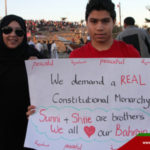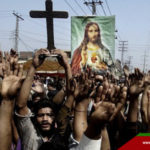By Yasin T. al-Jibouri
(Excerpted from his forthcoming book, “The Infallible Series”)
YEAR OF THE DEPUTATIONS (630 A.D.)
During the ninth year of the Hijra, a large number of deputations from far-flung pagan Muslim tribes came to the Prophet to accept Islam. Among them were Banu Thaqif and Banu Hawazin of Taif who were urged by Malik ibn Awf that it was time now to enter the Islamic fold. These were the same people who had once driven the Prophet out of their city and whose siege after the battle of Hunain had been lifted by the Muslims. They had been impressed by the record of those who were accepting the Islamic creed, by the exemplary conduct of Malik and the other Muslims of his tribe, and the news of Muhammed being a true prophet was fast spreading among them.
In order to preach the doctrines of Islam, teachers were sent to different provinces. They were directed by the Prophet to “deal gently with the people, and not to be harsh. Give them glad tidings and do not condemn them. And you will meet with many People of the Book who will question you: `What is the key to heaven?’ Tell them that it is to testify to the Unity of God, and to do good deeds.”
The tribe of Tay was, however, was creating some problems for the Muslims. Ali was marched with a small force to discipline them. The chief of the tribe, `Adi son of Hatim, fled but his sister and some of his principal clansmen fell into Ali’s hands. Having had regard for the great benevolence and generosity of her father, Hatim, the Prophet set the daughter free, along with all the captives, giving them many gifts. They were so touched by this generous treatment that the entire tribe, including its chief `Adi, accepted Islam.
PAGANS FORBIDDEN FROM ENTERING THE VICINITY OF THE KA`BA (630 A.D.)
Towards the end of the year, an order was issued prohibiting non-believers from entering the Ka`ba or performing idolatrous rites and degrading ceremonies of their cults within its sacred precincts.
It is recorded that first Abu Bakr was sent with Chapter Al-Bara`ah to proclaim it before the Pagans. But Gabriel said to the Prophet, “Except for the person who is from your own family, nobody can ably preach it.” So he called Ali and charged him with the duty of preaching the relevant ayats of Al-Bara’ah. Abu Bakr, therefore, returned to the Prophet and asked him, “O Messenger of Allah! Did you receive any decree from Allah against me?” The Prophet replied by saying, “No, but the Lord ordered that either I or someone from my own house should preach it.”
`Abdullah ibn Ubayy, head of the hypocrites, died in the month of Thul-Qi`da of the same year.
In the next month, Thul-Hijjah, the time of the pilgrimage, the following proclamation was read out by Ali: “No idolater shall after this year perform the pilgrimage; no one shall circle (the Ka`ba) naked. Whoever has a treaty with the Prophet, it shall continue to be binding till its termination. As for all others, four months are allowed to everyone to return to his territory. Thereafter, there will be no obligation on the Prophet except towards those with whom treaties have been concluded.”
MUBAHALA (630 A.D.)
There is no room here to trace how Christianity was disseminated in Nejran; suffices to say that the Ethiopian invasion of southern Arabia introduced Christianity there for the first time. The incident of Abraha and his elephant demonstrates the fact that they were quite fanatical in their religious fervor.
In 630 A.D., Prophet Muhammed sent a letter to Nejran’s bishop the contents of which are narrated by the grandson of its recipient, namely Salamah ibn Abd Yashu`, as follows:
In the Name of Allah, the God of Abraham, Isaac, and Jacob, from Muhammed, the Messenger of Allah, to the Bishop of Nejran and to the people of Nejran: If you accept Islam, I shall praise on your behalf the God of Abraham, Isaac and Jacob. I invite you to worship Allah rather than to worship the servants of Allah, and I invite you to accept the authority of Allah rather than the authority of His servants. But if you refuse, you will have to pay the jizya. And if you refuse to pay the jizya, then I warn you of war. Wassalam.
Having read this letter, the bishop was terrified. He called a man of Nejran named Shurhabil ibn Wada`ah to his presence, passed the Prophet’s letter to him to read then asked him what he had to suggest. Shurhabil said, “Do you know of the promise which Allah had made to Abraham with regard to the offspring of Ishmael, that they will have a prophet rising from among them, so could this man be he? I cannot pass a judgment about Prophethood, but if you ask me about anything relevant to life’s matters, I can make suggestions to you.” The bishop then solicited the suggestion of one man from Nejran after another, and the answer was the same. Finally, they decided collectively to send Shurhabil ibn Wada`ah, Abdullah ibn Shrhabil, and Jabbar ibn Fayz to meet the Prophet and to report to them their impressions of him. These are the same men known as the `Aqib, Sayyid, and al-Ahtam, namely Abul-Harith, respectively.
They were considered to be leaders in all affairs, and the were joined by eleven more, making their total number fourteen. When the deputations reached Medina, they dressed themselves in silk garments, put on gold rings then went to the mosque. All of them greeted the Prophet traditionally, but the Prophet did not respond, turning his face away from them. They left the mosque and approached `Othman and `Abdul-Rahman ibn `Awf complaining thus: “Your Prophet wrote us inviting us here, but when we came to him and greeted him, he neither reciprocated our greeting nor said a word to us. Now what do you advise us to do? Should we go back or wait here?” `Othman and `Abdul-Rahman ibn `Awf sought Ali’s advice. Ali said, “These people should first remove the silk clothes and gold rings. Then they should go and see the Prophet.” When they did as they were advised, the Prophet responded to their greetings and said, “By the Lord Who has appointed me as His own Messenger, when they first came to me, they were accompanied by Satan.” Thereafter, the Prophet preached to them and invited them to accept Islam. They asked him: “What is your opinion about Jesus?” The Prophet said, “You may rest today in this city and, after being refreshed, you will receive the reply to all your questions from me.”
On the next day, the Prophet recited to them these Qur’anic verses:
Surely the likeness of `Isa (Jesus) is with Allah as the likeness of Adam: He created him from dust then said to him, `Be’, and he was. The truth is from your Lord, so you should not be of those who doubt (it).
(Qur’an, 3:59-60)
They did not accept the words of the Lord and insisted on their own belief. Then the following verse was revealed:
But whoever disputes with you in this matter after what has come to you of the knowledge, say: Come! Let us call our sons and your sons, and your women and our women, and ourselves and yourselves, then let us pray earnestly and bring about the curse of Allah on the liars.
(Qur’an, 3:61)
They sought a day’s respite and privately solicited `Aqab’s advice. He said, “By God! You know that Muhammed is the Messenger of the Lord and that he has given a clear and appreciable verdict. Do not enter into a maledictory trial with him or else you should be destroyed. If you wish to remain adhering to your religion, accept to pay the jizya and make a pact.” On the next day, therefore, they came out on one side and on the other the Prophet came out of his house carrying Husain in his arms as Hasan was walking by his side holding his finger. Behind him was Fatima and behind her Ali. Praised be to Allah! What a time it was! What an atmosphere! How good a witness and how glorious the witnessed!
In short, the Prophet confronted the Christian delegates and said to Hasan, Husain, Fatima and Ali: “When I curse them, you say `Amen’ together.” When the Christians saw the five holy Purified ones, they were awe-stricken. Abul-Harith, who was their wisest, said, “My people! At this moment, we are looking at such personalities that if they pray to God, they can move mountains. Abstain from this maledictory conflict (Mubahilah) or else you should be destroyed and no Christian will remain on the face of the earth.” They pleaded to the Prophet thus: “O Abul-Qasim! We shall not have a malediction with you.” The Prophet invited them to accept Islam. They declined again and said that they were prepared for a treaty that they would present every year two thousand pieces of garments costing 40 dirhams each. According to another tradition, it is said that they also agreed to give 30 horses, 30 camels, 30 coats of mail and 30 spears every year. Thus, a settlement was made.
When the Christians of Najran declined from resorting to a maledictory conflict against the Prophet, he said, “By the Lord Who has appointed me His Messenger in truth, had they chosen the malediction, there would have been a shower of fire upon them in this very field.” Jabir says, “The verse (Chap. 3, verse 61) was revealed in reference to this contest. In this verse, the word “selves” refers to the Prophet and Ali; the word “sons” refers to Hasan and Husain, and the word “women” refers to Fatima.”
In Tabari’s Tarikh, it is stated that during the 10th year of Hijra, the Prophet sent Ali to Yemen. Prior to that, he had sent Khalid ibn al-Walid in order to call the people of Yemen to Islam, but nobody accepted Islam. Then the Prophet sent Ali and authorized him that he might, if he so desired, dismiss Khalid or anyone else from his party. So, Ali went to Yemen and read the Prophet’s statement to the people there. As a result, in one day, all members of the clan of Hamadan were converted to Islam. Ali informed the Prophet of this success whereupon the Prophet said, “Peace be upon the Hamdanites!” Thereafter, all Yemenites entered into the folds of Islam. Ali again informed the Prophet of the progress which he had made. The Prophet was so elated, he offered an sajdah(prostration) to thank Allah.
During this year, the Prophet deputed Ali to go to receive the jizya from the Najranites. Ali obeyed the orders and joined the Prophet only during the Farewell Pilgrimage. It was on the 25th of Thul-Qi`dah/February 25, 632 A.D. that the Prophet left Medina forhajj.
THE FAREWELL PILGRIMAGE (631 A.D.)
In this year (10 A.H./632 A.D.), the Prophet performed his last pilgrimage. During his journey back, he stopped at Ghadir Khum.
Al-Nasa’i in Kitabul Khasa’is narrates a tradition from Zayd ibn al-Arqam on the authority of Abu al-Tufail which runs thus: “Returning from the Farewell Pilgrimage, the Prophet camped at Ghadir Khum. He ordered a pulpit to be made for him. Once the pulpit had been constructed, he graced it and said, “I have been called back by the Lord, and I have submitted to His orders. Now I leave among you two valuable things, one of them is the Qur’an and the other is my progeny. These shall not separate from each other till they meet me together at the Pool of Kawthar in Heaven; therefore, be careful and guard yourselves in your dealings with the Qur’an and with my progeny after me.” Then the Prophet added, “Hearken! Allah is my Master, and I am the master of the believers.” Then he raised Ali’s hand and said, “Ali is the Master of whoever accepts me as his master. O Lord! Befriend whoever befriends Ali and alienate Yourself from whoever alienates Ali!” Abu al-Tufail says, “When I heard this tradition, I inquired from Zayd ibn al-Arqam: `Did you hear the Prophet saying these words?’ Zayd ibn al-Arqam said, `Not only did I but all those who surrounded the pulpit (did so). They had seen with their own eyes that the Prophet was speaking those words, and they heard them with their own ears.”
According to another tradition quoted by al-Nasa’i, the Prophet stood up and, having praised the Lord and enOmerated His bounties, he asked the gathering, “My people! Do you not know that I have more authority over you than you yourselves have?” All of them replied, “Yes, we bear witness to the fact that you have more authority over us than we have ourselves.” Then the Prophet held Ali by the hand and said, “Ali is the Master of anyone whose master I am.” This incident took place on the 18th of Thul-Hijjah, 10 A.H./March 19, 632 A.D.
Skeptics who have any doubt about this momentous event in the Islamic history are advised to review the Al-Ghadir 11-volume encyclopedia compiled by Hasan al-Amin which is dedicated in its entirety to documenting all the details of this incident. It contains the names of a large number of eye witnesses from among the sahaba who had witnessed the event and what happened to those who did not honour their pledge, which they swore in the presence of the Prophet, to accept Ali as the successor to the Prophet. It also contains thousands of poetry lines composed on the occasion, including a poem composed there and then by the Prophet’s poet Hassan ibn Thabit. Needless to say, the text of this encyclopedia is in Arabic. Only Shi`a Muslims now celebrate Eid al-Ghadir every year in memory of that incident… They have been doing so since 12 A.H./633 A.H.
PROPHET’S ILLNESS, USAMAH’S EXPEDITION (632 A.D.)
In the Tarikh book of Abu al-Fida’, it is stated that “After his return from the Farewell Pilgrimage, the Prophet resided in Medina till the close of the 10th year of Hijra. In Muharram of 11 A.H./April 632 A.D., the Prophet fell ill. Then he called all his wives at the residence of Maimuna, Mother of the Faithful, where he was staying at that time, requesting them to permit him to remain at the residence of any one particular wife from among them. All of them allowed him to stay during the period of his illness at `Ayisha’s.”
Ibn al-Wardi writes in his history work that during his illness, the Prophet commissioned an army to be led by Usamah son of the late Zayd ibn Harithah to march to Mu’ta in order to avenge the death of his father. The Prophet insisted upon its immediate departure.
On the next day, in spite of his serious condition, the Prophet personally prepared a flag and handed it over to Usamah saying, “Go in the Name of Allah and fight the infidels in His Name.” Usamah went out and handed over the standard to Buraidah ibn al-Khusaib whom he appointed as the army’s standard-bearer. Having left Medina, he stopped at a village named Jarf which is close to Medina and the army gathered there. The Prophet had also ordered that barring Ali, all other principal Immigrants and Helpers, including Abu Bakr, `Omer, `Othman, Sa`ad ibn Abu Waqqas, Abu `Obaydah ibn al-Jarrah and others, should accompany Usamah. Some companions felt insulted at the Prophet’s appointing a son of a freed slave to lead the senior Immigrants and Helpers, so they started grumbling and criticizing. When the news reached the Prophet, he felt dismayed. Despite his pain of fever and headache, he angrily came out of his residence, mounted the pulpit and declared:
O people! What is this you are saying on Usamah’s appointment as the commander of the army? You talked in a similar manner when Usamah’s father was commissioned to lead the army in the battle of Mu’ta. By Allah, Usamah deserves to be a commander and his father also deserved the leadership of the army.
Al-Shahristani, in his book Kitabul Milal wan Nihal, and Nawwab Siddiq Hasan Khan in his book Hujajul Karamah, state that the Prophet ordered his companions thus: “Make haste in joining Usamah’s legion. May Allah curse whoever lags behind Usamah’s army.”
In Madarijun-Nubuwwah, the following is stated: “Then, in accordance with the orders of the Prophet, Usamah went to the camp and ordered the army to march. When he was about to mount his steed, his mother informed him that the Prophet was in the agony of death. Receiving this news, Usamah and other companions went back. Abu Bakr and `Omer were still in Medina; they did not join the army…”
DEATH AND BURIAL (632 A.D.)
In Muslim’s Sahih, there is a famous tradition narrated by Ibn `Abbas saying:
Three days before the Prophet’s death, `Omer ibn al-Khattab and other companions were present by his side. The Prophet said, “Now let me write something for you whereby you shall not go astray after me.” `Omer said, “The Prophet is overcome by illness; you have the Qur’an, the Book of Allah, which is sufficient for us.” `Omer’s statement caused a furor among those present. Some were saying that the Prophet’s command should be obeyed so that he might write whatever he desired to write for their guidance. Others sided with `Omer. When the tension and uproar intensified, the Prophet said, “Get away from me!” Therefore, Ibn `Abbas used to say, “It was a calamity, an absolutely great calamity, that the conflict of opinion and noise made by the people came in the way of the Prophet’s writing a will and, because of it, the Prophet could not leave behind what he wanted to put on paper.”
Sa`eed ibn Jubayr’s narrative is thus recorded in Bukhari’s Sahih:
Ibn `Abbas said, “What a miserable day it was that Thursday!,” and he wept so bitterly that the pebbles lying there became wet with his tears. Then he continued, “On a Thursday, the Prophet’s sickness intensified. He said, `Get me the things to write with so that I may write something by which you may never be misguided after me.’ People differed and quarreled over the matter, although quarreling in the presence of the Prophet was unseemly. People said that the Prophet was talking in delirium. The Prophet cried out, `Go away from me! I am more sound than you are.’”
It is stated in Rawdatul-ahbab that the Prophet said to Fatima, “Bring your sons to me.” Fatima brought Hasan and Husain to the Prophet. Both of them greeted the Prophet, sat by his side and wept at witnessing the agony of the Prophet in such a manner that the people who saw them weeping could not hold their tears. Hasan rested his face upon the Prophet’s face and Husain rested his head upon the Prophet’s chest. The Prophet opened his eyes and kissed his grandsons lovingly, enjoining the people to love and respect them.” In another tradition, it is stated that the companions who were present there, having seen Hasan and Husain weep, wept so loudly that the Prophet himself could not hold his tears at their grief. Then he said, “Call my beloved brother Ali to me.” Ali came in and sat near the head of the Prophet. When the Prophet raised his head, Ali moved to the side and, holding the Prophet’s head, he rested it on his own lap. The Prophet then said, “O Ali! I have taken a certain amount from so-and-so Jew for the expenditure on Usamah’s army. See that you repay it. And, O Ali! You will be the first person to reach me at the heavenly reservoir of al-Kawthar. You will also be given a lot of trouble after my death. You should bear it patiently, and when you see that the people prefer the lust of this world, you should prefer the hereafter.”
The following is quoted in Khasa’is of Nasa’i from Umm Salamah: “By Allah, the closest person [to the Prophet] at the time of the Prophet’s death was Ali. Early on the morning of the day when he was going to die, the Prophet called Ali who had been sent out on an errand. He asked for Ali three times before his return. Ali, however, came before sunrise. So, thinking that the Prophet needed some privacy with Ali, we came out. I was the last to be out; therefore, I sat closer to the door than the other women. I saw that Ali lowered his head towards the Prophet and the Prophet kept whispering into his ears (for sometime). Ali, therefore, is the only person who was near the Prophet till the last.”
Al-Hakim, moreover, remarks in his Mustadrak that the Prophet kept confiding in Ali till the time of his death. Then he breathed his last.”
Ibn al-Wardi points out that the persons who were responsible for giving the Prophet his funeral bath were: Ali, `Abbas, Fadl, Qutham, Usamah and Shaqran. `Abbas, Fadl and Qutham turned the body. Usamah and Shaqran poured water, and Ali washed the body.
Tarikh al-Khamis adds the following: “`Abbas, Fadl and Qutham turned the body from one side to the other as Usamah and Shaqran poured water over it. All of them were blind-folded.”
Ibn Sa`d narrates the following in his Tabaqat: “Ali narrated that the Prophet had so enjoined that if anyone except himself (Ali) had given him the funeral bath, he would have gone blind.”
`Abdul-Barr, in his book Al-Isti`ab, quotes `Abdullah ibn `Abbas as saying, “Ali had four exceptional honours to his credit which none of us had: 1) Of all the Arabs and non-Arabs, he was the first to have the distinction of saying prayers with the Prophet. 2) In all the battles in which he participated, he alone held the Prophet’s banner in his hand. 3) When people fled from the battle-fields (at Uhud), leaving the Prophet alone, Ali ibn Abu Talib stood firmly by the Prophet’s side. 4) Ali is the only person who gave the Prophet his funeral bath and lowered him in his grave.”
Both Abu al-Fida” and Ibn al-Wardi indicate that the Prophet died on Monday and was buried the next day, i.e. Tuesday. And in one tradition, it is said that he was buried in the night between Tuesday and Wednesday. This appears to be more factual. But according to some others, he was not buried for three days after his death.
In Tarikh-al-Khamis, however, it is mentioned that Muhammed ibn Ishaq stated the following: “The Prophet died on Monday and was buried on the night of Wednesday.”
Estimating his age, Abu al-Fida” writes: “Although there is a difference of opinion about the Prophet’s age, yet calculated from famous traditions, he appears to have lived for 63 years.”
The Prophet departed from this world on the 28th of Safar, 11 A.H./May 28, 632 A.D.
Thus ended the life of the Final Prophet sent “As a witness and a bringer of glad tidings, a warner and a summoner to Allah by His permission, and a lamp that gives light” (Qur’an, 33:45-46), the one who was sent “As a mercy and blessing to mankind” (Qur’an, 21:10).
He left the temporal world, but the message he brought to mankind is eternal.
Now has come to you light from Allah and a clear book whereby Allah guides him who seeks His pleasure to the paths of peace. He brings them out of the darkness into the light by His decree and guides them to a straight path..
(Qur’an, 5:16)
A Book which We have revealed to you (O Muhammed!) so that you may thereby bring forth mankind from darkness to the light, by the permission of their Lord, to the path of Him, the One Exalted in power, the One worthy of all praise.
(Qur’an, 14:2)
O people! There has come to you an admonition from your Lord which is a healing for what is in the breasts, and a guidance and mercy for the believers.
(Qur’an, 10:57)
Accept what the Messenger gives you and stay away from whatever he forbids you.
(Qur’an, 59:7)
Surely Allah says the truth.
al-Tabatabai, Al-Mizan fi Tafsir al-Qur’an, Vol. 3, pp. 269-270.








